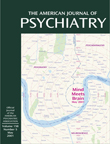Platelet Function and Sertraline
To the Editor: It was dismaying to read the article by Jerome H. Markovitz, M.D., M.P.H., et al. (1) concerning platelet function in depressed subjects before and after sertraline treatment. First, the statistical analyses of the data were faulty. Because of the performance of multiple t tests, the experiment-wise alpha should have been adjusted to a more stringent level. By use of the common Bonferroni method (2), the 0.05 alpha would have been divided by the number of t tests performed. If the data had been analyzed correctly, there would have been no significant differences between depressed and comparison subjects, or in depressed patients before and after sertraline treatment, in the parameter of in vitro collagen-induced platelet activation. In addition, the authors went beyond their data by stating in their discussion that “depressed patients with a family history of coronary heart disease may have increased fibrinogen receptor binding, although the findings were not statistically significant due to the small number of subjects” (p. 1007). In fact, the difference was not statistically significant—period!
Finally, in explaining their unusual finding of lower levels of serotonin (5-HT) 5-HT2A receptor density in the depressed group, Dr. Markovitz et al. referred to “previous studies (8, 9)” (p. 1007) in which the density was found to be higher in the depressed group. They suggested that smoking may have been a confound in those two studies. However, this was disingenuous. They should have cited those two studies as mere examples of many such studies. Indeed, as of early 1999 (3), there had been at least 15 separate studies of platelet 5-HT2A receptor density in major depressive disorder; nine of them found higher densities in depressed patients, and the rest found no difference. It is unlikely that smoking could have confounded 15 previous studies, with their own study providing the only true, unconfounded results.
1. Markovitz JH, Shuster JL, Chitwood WS, May RS, Tolbert LC: Platelet activation in depression and effects of sertraline treatment: an open-label study. Am J Psychiatry 2000; 157:1006–1008Google Scholar
2. Godfrey K: Comparing the means of several groups, in Medical Uses of Statistics, 2nd ed. Edited by Bailar JC, Mosteller F. Boston, NEJM Books, 1992, pp 233–257Google Scholar
3. Mendelson SD: The current status of the platelet 5-HT2A receptor in depression. J Affect Disord 2000; 57:13–24Crossref, Medline, Google Scholar



